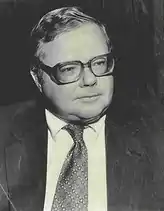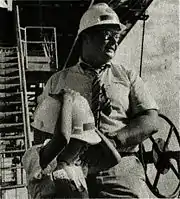Roger MacBride
Roger Lea MacBride (August 6, 1929 – March 5, 1995) was an American lawyer, political figure, writer, and television producer. He was the presidential nominee of the Libertarian Party in the 1976 election. MacBride became the first presidential elector in U.S. history to cast a vote for a woman when, in the presidential election of 1972, he voted for the Libertarian Party candidates John Hospers for president and Theodora "Tonie" Nathan for vice president.[1][2]
Roger MacBride | |
|---|---|
 | |
| Member of the Vermont House of Representatives | |
| In office 1963–1965 | |
| Personal details | |
| Born | Roger Lea MacBride August 6, 1929 New Rochelle, New York, U.S. |
| Died | March 5, 1995 (aged 65) Miami Beach, Florida, U.S. |
| Political party | Republican (before 1972, 1980s–1995) Libertarian (1972–1980s) |
| Alma mater | Princeton University Harvard University |
He was co-creator and co-producer of the television series Little House on the Prairie.[3]
Background
MacBride was born in 1929 in New Rochelle, New York, the son of Elise Fairfax (Lea) and William Burt MacBride, an editor.[4][5][6] He called himself "the adopted grandson" of a family friend, writer, and political theorist Rose Wilder Lane,[7] whom he met for the first time when he was 14 years of age.[8][9] Lane – the daughter of writer Laura Ingalls Wilder, who was noted for writing the Little House series of books – designated MacBride as a "political disciple," as well as her executor and sole heir.[4]
MacBride was a graduate of Princeton University and Harvard Law School.[4]
Law career
MacBride worked for the Wall Street-based law firm White & Case for several years before opening a small practice in Vermont.[4] By the mid-1970s, MacBride had relocated to Virginia and was no longer practicing law full-time.[2]
Writing and television producing career
MacBride inherited Lane's estate including rights to the substantial Ingalls-Wilder literary estate, including the "Little House on the Prairie" franchise.[4] He is the author of record of three additional "Little House" books, and began the "Rocky Ridge Years" series of children's novels, describing Lane's Ozark childhood.[4][7] He published two books on constitutional law – The American Electoral College and Treaties versus the Constitution,[10] as well as a Libertarian Party manifesto – A New Dawn for America: The Libertarian Challenge.[4]
In the 1970s, MacBride co-created the television series Little House on the Prairie and served as a co-producer for the show.[2][7]
Political career
Vermont politics
MacBride was elected to the Vermont House of Representatives in 1962 and served one term.[11] While in the state legislature he proposed the abolition of the state college system.[12]
Running as a Goldwater Republican,[13] he made an unsuccessful bid for the Republican Party nomination for Governor of Vermont in 1964.[10][11][14]
1972 electoral vote
MacBride was the treasurer of the Republican Party of Virginia in 1972 and one of the party's electors when Richard Nixon won the popular vote for his second term as President of the United States.[15] MacBride, however, as a "faithless elector," voted for the nominees of the Libertarian Party – presidential candidate John Hospers and vice-presidential candidate Tonie Nathan. In doing so, MacBride made Nathan the first woman in U.S. history to receive an electoral vote.[10][15] Political pundit David Boaz later commented in Liberty magazine that MacBride was "faithless to Nixon and Agnew, anyway, but faithful to the constitutional principles Rose Wilder Lane had instilled in him."[16]
1976 presidential campaign

After casting his electoral vote in 1972,[10] MacBride instantly gained favor within the fledgling Libertarian Party, which had only begun the previous year.[17] As the Libertarian presidential nominee in 1976,[2] he achieved ballot access in 32 states;[4] he and his running mate, David Bergland,[18] received 172,553 (0.2%) popular votes by official count, and no electoral votes. His best performance was in Alaska, where he received 6,785 votes, or nearly 5.5%.[10][19] In his campaign the issues that he supported included a free market system, a return to the gold standard, the abolition of the Federal Reserve, an end to corporate welfare, the abolition of the FCC, a foreign policy of non-interventionism, and abolishing all victimless crimes.[20]
Republican Liberty Caucus
MacBride rejoined the Republican Party in the 1980s and helped establish the Republican Liberty Caucus, a group promoting libertarian principles within the Republican Party.[7][21] He chaired this group from 1992 until his death in 1995.[22]
Family
MacBride married Susan Ford. They then adopted a baby whom they named Abigail MacBride.[23]
Laura Ingalls Wilder literary estate
McBride was designated by Rose Wilder Lane as her heir. He gained control of her literary estate on her death in 1968. In 1971 he had The First Four Years published. In 1974 he edited and published Laura Ingalls Wilder's letters to her husband Almonzo as West From Home. He was later the producer for the Little House on the Prairie TV series. He was the credited author of a fictionalized series on the life of Rose Wilder Lane.[23]
Death
MacBride died of heart failure on March 5, 1995.[4] A controversy ensued upon his death when the local library in Mansfield, Missouri, contended that Wilder's original will gave her daughter ownership of the literary estate for her lifetime only, and that all rights were to revert to the Laura Ingalls Wilder Library after her death.[24] The ensuing court case was settled in an undisclosed manner, but MacBride's heirs retained the rights.[25]
In an obituary for MacBride, David Boaz wrote, "In some ways he was the last living link to the best of the Old Right, the rugged-individualist, anti-New Deal, anti-interventionist spirit of Rep. Howard Buffett, Albert Jay Nock, H. L. Mencken, Isabel Paterson, and Lane."[16]
Partial bibliography
- Series on the early life of Rose Wilder
- Little House on Rocky Ridge (1993)
- Little Farm in the Ozarks (1994)
- In the Land of the Big Red Apple (1995)
- On the Other Side of the Hill (1995)
- Little Town in the Ozarks (1996)
- New Dawn on Rocky Ridge (1997)
- On the Banks of the Bayou (1998)
- Bachelor Girl (1999)
- A New Dawn for America: the Libertarian Challenge
References
- "Virginian switches his electoral vote". The Free Lance–Star. Associated Press. December 19, 1972. Retrieved July 25, 2012.
- St. John, Jeffrey (September 30, 1975). "MacBride Plans Campaign". Merced Sun-Star. Retrieved July 25, 2012.
- Saxon, Wolfgang (March 8, 1995). "Roger MacBride, 65, Libertarian And 'Little House' Heir, Is Dead". The New York Times. ISSN 0362-4331. Retrieved November 9, 2016.
- Saxon, Wolfgang (March 8, 1995) "Roger MacBride, 65, Libertarian And 'Little House' Heir, Is Dead", The New York Times. Retrieved June 15, 2011.
- kanopiadmin (March 30, 2010). "The Libertarian Legacy of Rose Wilder Lane - Jeff Riggenbach". mises.org. Retrieved April 16, 2018.
- "Annie Elise Wing Lea 1873 – 1935 - CataumetCemetery.org". www.cataumetcemetery.org. Retrieved April 16, 2018.
- Thies, Clifford F. (October 1997). "Cast a Giant Ballot: Roger MacBride Made the Libertarian Party the Most Important Third Party in America". The Freeman. Retrieved July 27, 2012.
- Holtz, William (1995). The Ghost in the Little House: A Life of Rose Wilder Lane. University of Missouri Press. pp. 323, 373. ISBN 9780826210159.
- Doherty, Brian (2008). Radicals for Capitalism: A Freewheeling History of the Modern American Libertarian Movement. PublicAffairs. p. 131. ISBN 978-1586485726. ISBN 9781586485726
- Boaz, David (2008). "MacBride, Roger Lea (1929–1995)". In Hamowy, Ronald (ed.). The Encyclopedia of Libertarianism. Thousand Oaks, CA: SAGE; Cato Institute. pp. 310–11. doi:10.4135/9781412965811.n186. ISBN 978-1412965804. LCCN 2008009151. OCLC 750831024.
- Lawyer Politicians in Virginia: Roger Lea MacBride (1929–1995), The Political Graveyard. Retrieved July 25, 2012.
- "Roger Lea MacBride '51". Princeton Alumni Weekly. July 7, 2017. Retrieved October 22, 2020.
- Chamberlain, John (September 1, 1964). "A Goldwater Man in Vermont". The Times-News. Retrieved July 25, 2012.
- (1964) Primary Election Results Archived May 18, 2013, at the Wayback Machine, Office of the Vermont Secretary of State. State Archives. Retrieved July 25, 2012.
- Adams, Mason; Sluss, Michael (June 13, 2011). "Remembering Virginia's "faithless" elector of 1972". The Roanoke Times. Retrieved July 26, 2012.
- Boaz, David "Roger Lea MacBride, 1929–1995", Liberty, March 1995, p. 13.
- Doherty, Brian (2008). Radicals for Capitalism: A Freewheeling History of the Modern American Libertarian Movement. PublicAffairs. pp. 393–95.
- "Libertarian candidate to visit". Daily News. March 18, 1976. Retrieved July 25, 2012.
- "1976 Presidential General Election Results", Dave Leip's Atlas of U.S. Presidential Elections. Retrieved July 25, 2012.
- "MacBride's New Book" (PDF). Archived (PDF) from the original on March 30, 2017.
- The Republican Liberty Caucus Library, Republican Liberty Caucus: Background and Early History, Retrieved July 26, 2012. Archived June 9, 2012, at the Wayback Machine
- The Republican Liberty Caucus, History of our Movement, Retrieved July 26, 2012.
- "Roger Lea MacBride". www.liwfrontiergirl.com. Retrieved October 22, 2020.
- Langton, James (November 29, 1999) "Library claims rights to `Little House' books", Chicago Sun-Times via HighBeam Research (subscription required). Retrieved July 26, 2012.
- Margolis, Rick (June 1, 2001) "Settlement on 'Little House' Books", School Library Journal. Retrieved July 26, 2012.
External links
| Wikiquote has quotations related to: Roger MacBride |
- Riggenbach, Jeff (April 14, 2010). "The Libertarian Legacy of Rose Wilder Lane". Mises Daily. Ludwig von Mises Institute.
Transcribed from 'Roger MacBride and Rose Wilder Lane: A Libertarian Legacy'
- Roger Lea MacBride at Library of Congress Authorities, with 20 catalog records (previous page of browse report, under 'MacBride, Roger Lea, 1929–' without '1995')
| Party political offices | ||
|---|---|---|
| Preceded by John Hospers |
Libertarian nominee for President of the United States 1976 |
Succeeded by Ed Clark |